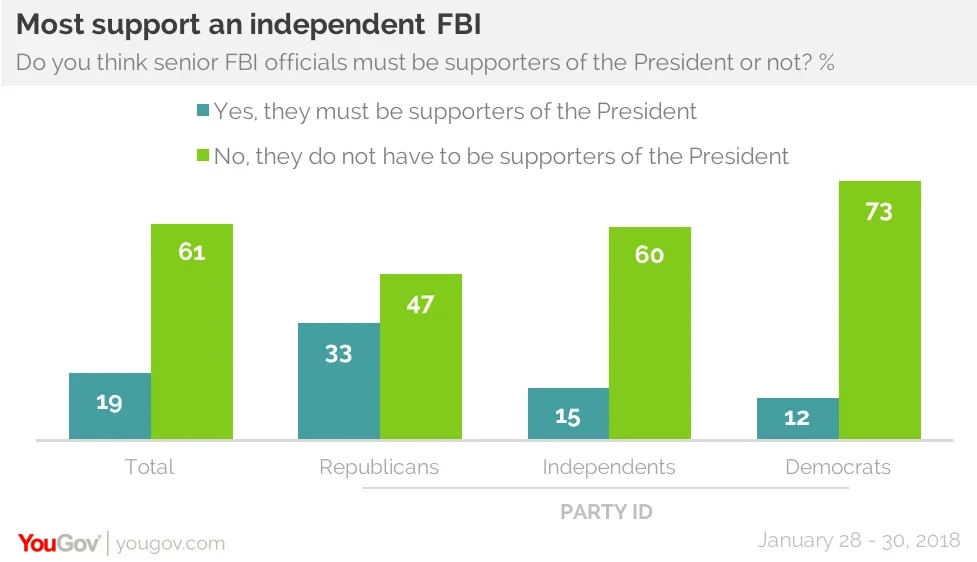A majority believe that it's inappropriate to link one's voting record to one's career
Americans don’t think that how someone votes should matter when it comes to getting or keeping a job, and overwhelmingly prioritize the independence of the Federal Bureau of Investigation over political loyalty to an Administration.
In the latest Economist/YouGov Poll, the preference for independence in law enforcement is not partisan, as Republicans as well as Democrats reject the belief that senior FBI officials need to be supporters of the President (though Republicans are more closely divided than Democrats or independents on this question).
The poll was conducted this weekend, as Deputy FBI Director Andrew McCabe resigned just weeks ahead of his expected March retirement from the Bureau. McCabe had been criticized by President Trump, including on Twitter, for political bias, and claimed he had been asked by the President how he had voted when he met the President upon assuming the role of acting FBI Director. McCabe did not vote in the 2016 election.
The public sees the FBI as an independent agency, not necessarily one loyal to any incumbent President. Public support for the independence of the agency as a whole was even more clear: just 13% said the FBI should be loyal to the President, including just 24% of Republicans.
There is an even more unanimity on the inappropriateness of asking about one’s Presidential vote in a job interview, of using it as a basis for hiring, and of firing someone because of it.
Belief that it is inappropriate to fire someone for their vote extends to firing a career civil servant. Two-thirds of Republicans agree.
While there is relative unanimity on the inappropriateness of asking about linking someone’s voting behavior to their job, relatively few people were aware of the controversy. In fact, most said they had heard “nothing at all” about the reports President Trump asking McCabe about his presidential vote.
This controversy is just a piece of the news linked to Special Counsel Robert Mueller’s investigation of whether or not there was Russian interference in the 2016 presidential election. That investigation is definitely now seen through a partisan lens. Just as many have an unfavorable opinion of Mueller as have a favorable one. Nearly as many disapprove of his performance as Special Counsel as approve. More than twice as many Republicans hold negative opinions of Mueller as have positive ones.
However, there is little support for firing Mueller, even among Republicans; 29% of Republicans would fire the Special Counsel, slightly more would not.
It’s unclear that the notion of a “deep state” working to overthrow this Administration is part of public consciousness, especially with those paying only a little attention to politics today. Nearly four in ten were unable to say whether or not they believed there was a “deep state” plot. But by five to one, Republicans believe that is what’s happening.
The President’s approval rating remains below 40%, back where it was before a short-lived rise in the poll conducted two weeks ago, just before the one-year anniversary of his inauguration. The positive movement on public assessments of the economy and his performance in that area found then have also slid back to where they had been before. This week, 39% approve of the way the President is handling his job, while 51% disapprove. As for the economy, the public is very closely divided: 43% approve, 42% do not. Two weeks ago, 49% approved of the President’s handling of the economy.
Read more topline and table results here
Image: Getty









